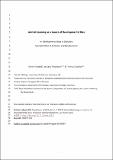Animal learning as a source of developmental bias
Abstract
As a form of adaptive plasticity that allows organisms to shift their phenotype toward the optimum, learning is inherently a source of developmental bias. Learning may be of particular significance to the evolutionary biology community because it allows animals to generate adaptively biased novel behavior tuned to the environment and, through social learning, to propagate behavioral traits to other individuals, also in an adaptively biased manner. We describe several types of developmental bias manifest in learning, including an adaptive bias, historical bias, origination bias, and transmission bias, stressing that these can influence evolutionary dynamics through generating nonrandom phenotypic variation and/or nonrandom environmental states. Theoretical models and empirical data have established that learning can impose direction on adaptive evolution, affect evolutionary rates (both speeding up and slowing down responses to selection under different conditions) and outcomes, influence the probability of populations reaching global optimum, and affect evolvability. Learning is characterized by highly specific, path‐dependent interactions with the (social and physical) environment, often resulting in new phenotypic outcomes. Consequently, learning regularly introduces novelty into phenotype space. These considerations imply that learning may commonly generate plasticity first evolution.
Citation
Laland , K N , Toyokawa , W & Oudman , T 2019 , ' Animal learning as a source of developmental bias ' , Evolution and Development , vol. Early View , e12311 . https://doi.org/10.1111/ede.12311
Publication
Evolution and Development
Status
Peer reviewed
ISSN
1520-541XType
Journal article
Description
Research supported in part by a grant from the John Templeton Foundation to K. N. L. (“Putting the extended evolutionary synthesis to the test”, ref 60501), by Japan Society for the Promotion of Science KAKENHI to W. T. (ref 17J01559), and a grant from the Netherlands Organization for Scientific Research to T. O. (ref 019.172EN.011).Collections
Items in the St Andrews Research Repository are protected by copyright, with all rights reserved, unless otherwise indicated.

